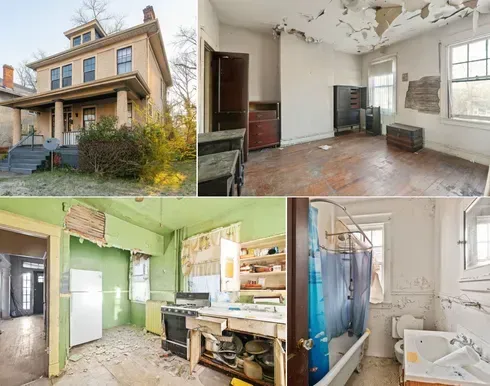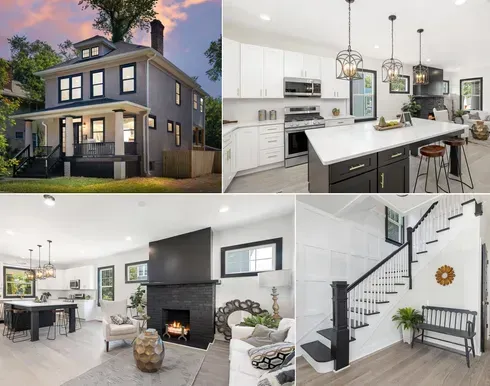Call Us: (270) 883-2723
Address: 3577 Cemetery Rd. Bowling Green KY. 42103
Get cash in hand fast, with no fuss.
Sell your Kentucky home stress-free with the right home cash buyers.
USA House Partners is a locally-owned business that pays cash for Bowling Green, Kentucky homes. We can get you an offer faster than other buyers because we know the area like the back of our hand!
Forget spending money to make expensive repairs – we’ll take it as-is! Get rid of the burden and stress associated with selling through a Realtor. We provide simple, straightforward, cash offers with no fees, commissions or obligations.
Get an offer within 48 hours of submitting your information. Don’t wait weeks or months to close on a sale – get it taken care of as quickly as possible!

“ Greg did an outstanding job getting his entire team involved in the sale of my home. He communicated well, kept me in the loop, helped me get a good deal, and I would highly recommend him if you wanted to sell your home”
Thomas J ★ ★ ★ ★ ★

Get Your Fast, Fair Offer Today!
START HERE:
We buy houses in ANY CONDITION. Whether you need to sell your home fast for cash or list with a local agent for top dollar, we can help.
USA House Partners buys houses in all conditions, so you can forget about the hassle of dealing with repairs and commissions – get an all-cash offer and close fast.
There is no pain involved with fair pricing and quick closings. You can now sell your house for cash in Kentucky without pulling your teeth, and we can help you do that. We are genuine cash buyers with the best way to sell your home quickly by offering a straightforward process without the hassles of having to prepare for showings or wait for bank approvals and appraisals

Fast, Hassle-free offering process
No Commissions or Fees
We create win-win solutions.
We buy houses for cash of any condition at a fair price and make it easy for you throughout the entire offering process. We take on all the complications, so you save time.
We offer No Commissions or Fees when we buy your home – just a fair cash offer – giving you total value for your property without ever having to lift a finger.
As cash home buyers, one of our core values is to create a win-win solution. We’ll ensure that everyone’s interests are considered – yours included – so everybody can walk away happy with the deal.
Don’t pay commissions or worry about making expensive repairs. USA House Partner is here to help you get the best buys in Kentucky in as little as 30 minutes without paying agent fees.
✅ Get Instant Cash Offer
No need to wait any longer. We’ll rapidly review the information given and make you an estimate within 30 minutes of visiting. Save yourself weeks of costly negotiations with real estate agents and brokers.
✅ No Need to pay for Service cost
Not only do we make the sale process a breeze, but our services cost you absolutely nothing! We cover all closing and paperwork costs so that you can maximize the value of your sale with no strings attached.
✅ No Realtor Charges , No Agents Fees, NO COMMISSIONS!
You can finally avoid all the extra money paid to agents and brokers that eat away from your profits. Working with USA House Partners will let you keep more money in your pocket because everything is done in-house.
✅ We’ll buy in ANY Condition
We buy homes as is, so there’s no need for costly repairs or renovation projects focused on increasing your home’s value or making it look better. Get an offer today.
✅ Get Cash on Hand Within 7 to 14 Days
Depending on how quickly we can close, we can get your money in hand in as little as 7-14 days.
WE ARE TRUE CASH BUYERS WHO HAVE PURCHASED MORE THAN 300 PROPERTIES.
When we say we are genuine cash home buyers, we mean it. You won’t have to worry about waiting around for financing. We get the funds ourselves and offer you cash for your home.
On the Review page, We’ve detailed 10 Recent Cash Purchases, plus the stories of the people we helped.
Hi Sellers
It’s about time you stop running from foreclosures.
We are cash home buyers to brief your housing grief and buy houses in cash instantly within 7-14 business days.
Let’s be clear; we’re different from those in the Market.
Hi. I am Greg Raymer, the co-founder of USA House Partners, and we know that in the world of real estate, as with any other industry, there are people who do not always follow through on their promises.
We know that peace of mind is paramount when selling your house. That’s why we offer complete transparency. Upon request, we will provide you with a Proof of Funds letter with our partners (which operate in multiple U.S. markets We have purchased over 300 properties and are happy to provide ‘References’ from our recent seller clients.
Lastly, we use our cash for homes investment business to impact our local community. To date, through Impact Club®, more than $2.5 million has been donated to local charities to give back to our communities and improve the lives of those around us.
Here’s the before and after of the first 10 Projects my partners and I have bought for cash
BEFORE
AFTER


Backhand of the Story:
Our Facebook advertisement led the homeowner to contact us. The house needed significant repairs; a roof leak had caused the ceiling to cave in, and the home was uninhabitable; the owners wanted to fix it. However, they lacked the necessary capital to do so. So we gave them a hand by giving them a higher-ball cash offer than those in the Market. We settled on the deal, and the family received their cash within 7 days without getting into the hassle of listing.
No matter the reason for your sale, we can buy your house!
We buy house cash properties and pay cash up front, regardless of their condition. We don’t ask for any repairs or for you to clean the property—you can leave everything as-is. Plus, we’ll handle all closing costs and offer you a confidential, no-obligation quote.
When you work with us, it’s as if your worries disappear. You don’t have to worry about foreclosure, job loss, or even the hassle of managing renters if that’s what brought you here. And we don’t just buy your house, either: We strive to get top dollar for your property by finding the right buyer on the Market.
Our Partners
The Process
Timeframe
We’ve partnered with professional real estate investors throughout the country and have purchased over 300 properties since 2019 alone. That means you can rely on us when it comes time to make a sale.
Selling your house through us is simple, headache-free, and fast. You’ll receive a cash offer within 24 hours, and you don’t have to pay fees or do any repairs – even if you don’t want to clean up the house, that’s no problem! You’ll get a 100% transparent offer with no hidden fine print or confusion – just detailed information you can
You won’t have to wait forever either; we can close on a deal in as little as 7-14 days, so you’ll have cash in hand before long. What makes it even better is that by cutting out agents, banks, and inspectors from the traditional process, we make it simpler than ever before.
Why Do We Help
Why It’s in Our Best Interest to Give You the Highest Possible Offer?
When you sell your home to USA House Partners, you are working with a company that makes a profit by buying properties. We buy properties in Central Kentucky, Bowling Green, and surrounding counties. As a Kentucky property buyer, our first and foremost objective is to provide you with the highest cash offer so that you will view the sale of your property as a win-win situation.
We strive to create a win-win solution for our homeowners. It is difficult for savvy homeowners to accept lowball offers, and we buy your house with all cash and close quickly, so we never make lowball offers.
We can make you a cash offer through a simple three-step process and close on your terms in as little as seven days. This benefit works nicely for homeowners who want to receive such offers quickly without dealing with the problem of getting their house in shape before listing it on the Market. It’s also an ideal solution for people who need money immediately or have given up on finding buyers because it takes them months to close their transactions.
Are You In One Of These Situations?
“Help, I need to sell my house quickly”
There is a multitude of reasons why a person or family needs to have this happen. You are in the right place. Through a simple 3-step process, we can make you a cash offer and close on your terms, in as little as 7-days.
Vacant “as is” properties
There is nothing more costly than holding on to a vacant property. If it’s not fully paid off, there is a mortgage, there are taxes, there is ongoing maintenance that gets neglected. Each day, that house then depreciates.
Properties that can’t be financed
We see this all the time. A homeowner contacts a real estate agent. The real estate agent lists the property in the MLS. The traditional buyer tries to purchase that property by getting a mortgage. But because of the condition of the property, the bank won’t lend the money to purchase. So the sale falls through. It goes back on the market. And this cycle repeats.
Distressed properties
If you’re behind on your mortgage payment. If you have unpaid taxes. If you’re facing foreclosure or have experienced a bankruptcy. If there are liens against the property. All of these things can prevent a home from being sold because the title of the property has been clouded. For us, we specialize in these situations and help families escape them.
Financial hardships
With the rising cost of medical bills, putting people in extreme debt. Or rising unemployment, or due to a downturn in a person’s business, or high college tuition costs, many families find themselves needing to sell their home fast to escape this crushing pressure of financial stress. Each family is different. We customize each solution to each family.
Personal crisis / Family death
With 50% marriages ending in divorce, and 100% of lives ending in death, this creates lots of situations where a property between a couple, or an inherited property, may need to be sold quickly for financial or legal reasons.
Our Turnkey Partner Program Ask US is available upon request.
It’s simple as 1, 2, 3
Making a cash offer is the quickest and easiest way to sell your house. After telling us a bit about your property, we will pay a visit to see it. Finally, we will make you an offer. Our process is straightforward—no realtor fees and no frustrating delays. With USA House Partners, we make selling your house as easy as 1-2-3!
1. Brief us about your property.
We take the time to visit your property and assess its condition for our offer.
2 . We’ll pay a visit to your property.
After visiting, We will make you an offer that includes fair market value pricing and no hidden fees or commissions – with no obligation to accept.
3 . Close the deal with a fair cash deal
If our offer works for you, you select when you would like to close on the sale of your homeWe provide you a cash offer or property – with flexible closing dates available!
Save your Mortgage from Drowning and get better Cash Offers that Matches Your Property Value TODAY!!
Say goodbye once and for all to foreclosure, job loss, the death of a family, or just a pain-in-the-assed rental property you need to get rid of. USA House Partner is here to handle it quickly with minimal stress on your end! No showings and no lengthy paperwork – our experienced team will take the entire process and make this complicated situation fast and easy.
Contact Us and Sell Your House Quickly!
Unlike traditional intermediaries, we avoid agents, banks, and inspectors, simplifying the process that is typically complex and time-consuming.
The Bottom-line:
Since we are buying houses for cash companies, we aim to achieve a win-win outcome for all parties involved. It is common sense that no homeowner will accept a lowball offer. Our foremost objective is to become a company that buys houses in Kentucky for cash and provides you with the highest Cash Offer possible if you are interested in purchasing, renovating, or selling your property with us.
The team at USA House Partners is here to provide a stress-free way to sell your house quickly and at the best possible price. Our accurate cash-buying process is one of the fastest and most reliable ways to efficiently get rid of your home. We ensure a fair, good-natured environment for everyone involved.
We make sure to put our clients first and not pressure them into a sale they may not be comfortable with. We understand that life brings unexpected changes and challenges, and we will give you the highest possible offer to get you the cash you need promptly.
Small Call to Action Headline
Complete the form on this page.
We will schedule a date/time to look at the house,and make you an offer.
If our offer works for you, then you pick the perfect closing date. No frustrating setbacks. No inconveniences.
Consider:
You’ll have a Cash Offer within 24 hours. No fees. No repairs. Don’t clean if you don’t want to. Everything is headache-free. And there’s no obligation.
You’ll have 100% Transparent Offer. Nothing hidden. No fine print. We explain every detail. No confusion. We have a proven track record for helping families out of ANY and EVERY kind of situation!
We can close in as little as 7 to 14 days. Meaning, cash in hand.
We All Win, Or Nobody Wins!
We Have the Best Way to Sell Your House Quickly
Whether it’s foreclosure, job loss, death in the family or maybe just a pain-in-the-butt rental property you need to get rid of.
It doesn’t matter – we are here for you!
If you’ve reached the point where you simply don’t want to own the house any longer, let us know about it and we will handle it.
You can sell it to us for Cash or we will work to get top dollar for you on the market.
Our company buys houses for cash throughout Warren County in Kentucky. We can buy Houses in Brownsville, Elizabethtown, Franklin, Glasgow, Morgantown, Munfordville, Richmond, Owensboro, Russellville, Scottsville and Georgetown! 🙂
You can always talk to our representative in our office today by calling (270) 883-2723
Meet Greg!
I am a 20+ year real estate veteran, serving as the Broker/Owner of NextHome Realty Experts in Bowling Green, KY.
I have specialized in listing foreclosures for banks since Day 1 of my real estate career, always collaborating with investors and buyers seeking a fixer-upper to own and live in.
One niche I have grown fond of is investing in manufactured homes with land, as they represent a growing value for first-time home buyers amidst increasing home costs due to inflation.
I take great pride in working with buyers and sellers of all types of real estate, with a particular focus on manufactured homes.
If you have a manufactured home you need to sell, please contact me!
Bowling Green


Our Clients Saying


Greg was the best realtor! He always worked with our schedules to do showings, helped us find out forever home, and helped us sell our house within 48 hours. He was phenomenal to work with and is very personable!
ALLIE PARDUE


Mr. Greg Raymer Was very fast in responding to my phone calls and emails very prompt in turning in my offer and very prompt in letting me know the response very honest went above and beyond to help me every step of the way highly recommend.
Cindy Smith


Greg Raymer met our every need and was very professional. We were anxious to close, and he made that happen! Would definitely recommend him.
John Loid
About Us
USA House Partners is a broker licensed in the states of Kentucky, Tennessee and Florida.

Company
About Us
Contact Us
Conditions
Systems Site








